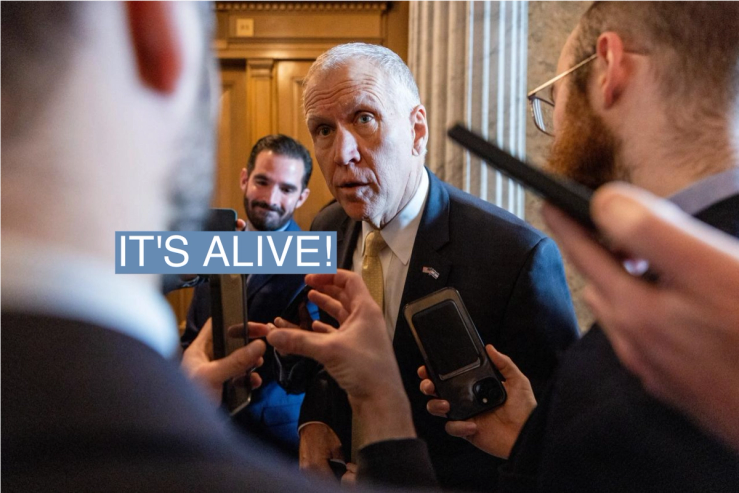The News
Forget what you might have heard last night: The border deal is still alive.
At least, that was the message Thursday from Senate Republicans involved in negotiating the national security package combining conservative border security reforms with aid to Ukraine and Israel. Minority Leader Mitch McConnell also waved off reports that he was backing away from the deal during a closed-door meeting with Republicans, telling his conference he was “fully onboard” according to lawmakers in the room.
Capitol Hill was plunged into confused speculation about the border compromise’s prospects on Wednesday, after Punchbowl News reported that McConnell had expressed doubts about the package due to opposition from Trump., who has been publicly and privately urging lawmakers to kill the unfinished legislation. McConnell reportedly told his members that “the politics of this have changed” and that leadership did not want to do “anything to undermine” Trump, whom he referred to as the party’s presidential nominee. Sen. Tim Scott, R-S.C., widely seen as a potential vice presidential contender, later told Fox’s Laura Ingraham that the deal was “DOA” in the Senate.
The comments led to some heated pushback from GOP lawmakers involved in talks.
“That’s like parallel universe shit. That didn’t happen,” said a visibly furious Sen. Thom Tillis, R-N.C. when asked if McConnell had said he wanted to defer to the former president. In a rare move, he noted that there was a transcript from the previous night’s meeting, and suggested that anybody who wanted to disagree with him should release it. (McConnell’s office didn’t respond to a request for comment.)
Sen. James Lankford, R-Okla., who has led Republican talks on the border, said that he believed McConnell’s comments were “getting overblown.“”I think he was saying out loud what a lot of people are thinking on this,” Lankford told Semafor. “When it started in October we were not in a presidential election year, this was a totally different moment on it. Now we are in the heat of a primary in a presidential election year. It’s a huge campaign issue. And it kind of gets sucked into all of this conversation. But he was very clear, he’s not making any recommendation. He’s not backing away from this.”
Though he was silent on the reports for much of morning, the minority leader himself reportedly clarified his comments in private afternoon meeting with his conference. “McConnell made it very clear that he is fully supportive of the border bill, the effort has been undertaken by James Lankford at his request, and as well as ongoing support for Ukraine,” Sen. Mitt Romney, R-Utah told reporters after emerging from the room. According to Sen. Mike Rounds, R-S.D., McConnell specifically noted that some conference members might have “misinterpreted” his previous comments and that he was “personally fully engaged in both the border and getting Ukraine and Israel together.”
Still, Sen. John Thune, the chamber’s No. 2 Republican, acknowledged to reporters in the morning that border and Ukraine talks were “at a critical moment” and seemed to suggest leaders were already considering backup options.
“We’ve got to drive hard to get this done and if we can’t get there we’ll go to plan B, but for now at least, there are still attempts being made to reach a conclusion,” he said.
If nothing else, the confusion over McConnell’s private comments underscores the growing divide among Senate Republicans making the national security package’s prospects, including future support for Ukraine, even more uncertain. While House conservatives have been grumbling over the unfinished bill for weeks, Trump’s Senate allies have become increasingly firm in their opposition. On Wednesday, for instance, Sen. Ted Cruz, R-Texas referred to the unseen legislation as a “stinking pile of crap.”
The View From Senate Democrats
Across the aisle, Sen. Chris Murphy of Connecticut, the chief Democratic negotiator, said he believed Republicans were unnerved by the nascent agreement since it’d address many issues in the border crisis and remove it as an election issue that Trump can campaign on. “That is what has precipitated this crisis inside of the republican conference,” he said. “They’ve seen the outlines of the agreement, they know that it actually will make a big difference at the border and some of them are panicking about that.”
Murphy also said that the border deal itself were effectively wrapped up, with a few final issues around drafting text left to be resolved.
“We’re at the finish line,” he said. “This is down to a political decision for Republicans as to whether they want to solve this problem or whether they want to keep it available for Trump to use it as a wedge.”
The View From The White House
White House principal deputy press secretary Olivia Dalton told reporters aboard Air Force One the administration is still “hopeful” that the negotiations could continue and produce a bipartisan agreement.
“The president has been clear: we need action on the border. We’ve been actively engaging in good faith, bipartisan negotiations with both Senate Democrats and Senate Republicans to that end. We believe there is no reason that shouldn’t continue,” Dalton said.

